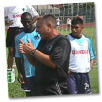PT’s and ATC’s
In regard to my post on Tracy Fobers post on physical therapists I got the following response: “Would love to hear more about your experience at GLATA, and your thoughts/opinions of this based on your interaction with both athletic trainers and physical therapists.” The program for the GLATA Convention was impressive. Looking at the program you would have say that the profession of athletic training has come a long way. They certainly have professionalized themselves over the years. Up to a point I think the field of “Strength & Conditioning” could learn some things from the athletic trainers and their governing body the NATA. That being said I think over the past couple of years the trainers are going down a one way street in the wrong direction. They are trying to be what they are not, and probably not intended to be. They are not Physical therapists. As I understand it their job is to provide primary care in athletic and clinical setting. I understand that in many situations because of need they must condition and rehab the athlete but that is not their primary job. I have the utmost respect for trainers and the role they have played in keeping athlete’s healthy and performing. Sometimes it is too easy to get caught up in trying to be something that we do not need to be. I know I am oversimplifying this issue, but that is my point of view as a coach and one who has hired ATC’s and been in charge of them in a professional setting. It is my understanding the hours in the training that were once a requirement have been modified, that is a shame if that is true. I always felt that the practical experience in the training room gave the beginning trainer an advantage coming out of school. That is unlike the Strength & Conditioning coach that only has to pass a paper and pencil test. I hope the old guard in the training profession will step and be the voice of reason on all of this.


4 Comments:
Many times the A.T. wears many hats, especially when covering a high school. (A.T., conditioning, nutrition, rehab....) Hopefully they have done some learning on their own to be able to do those things successfully. To really excel in all those areas requires a lot of extra homework.
Are P.T.'s more prepared to condition the athlete? My sense is that they are in the same boat as the A.T. They get some info, but really need to seek out more on their own.
I guess in any profession those who are not satisfied with what they already know are the ones who excel and are able to give the best service to the people they work with.
Mark Crabtree MS,ATC,CSCS
As the health care dollar keeps shrinking, the role of the ATC becomes more important. Many insurance companies will only pay for 6 P.T. visits. That's if they have insurance at all. It's a fact of life the amount of undocumented workers in the U.S. is increasing, and it's not going to change any time soon. They are not eligable for any health insurance. For those who feel the A.T. is impinging on their territory, believe me, it is not out of arrogance, but out of need- we don't have a choice.
You guys are right. There is limited money out there and folks need/want the service. It is better to be able to multi-task and do all you can to get the patients in and some $ to pay bills. The public will decide if you are good enough to stay around. Many folks in my profession are upset with other professions using manipulation. I understand why they are trying it - it works and you have to survive. I figure as long as I do it best at a reasonable price and do the other things to keep you well the bank will not take my house.
Mark Day D.C., CSCS, DACBSP
Excellent Post. I do however have one problem with the description of ATCs and their roles. ATCs are in fact taught rehabilitation skills in the core cirruculum of their education. Where this may differ from PTs is that it focuses soley on the rehabilitation of athletes. Where I think we as a profession have gone wrong is trying to claim knowledge in too many areas (elderly, workman's comp, etc.) This is not necessarly a view felt by all ATCs but in my humble opinion, its true. Both ATCs and PTs have a lot to offer and we would all be better off sticking to what we are good and and are trained to to.
Joe Cygan, MS, ATC
Athletic Trainer
United States Olympic Committee
PS: As a disclaimer, these are my views, not necessarly the USOC's.
Post a Comment
<< Home